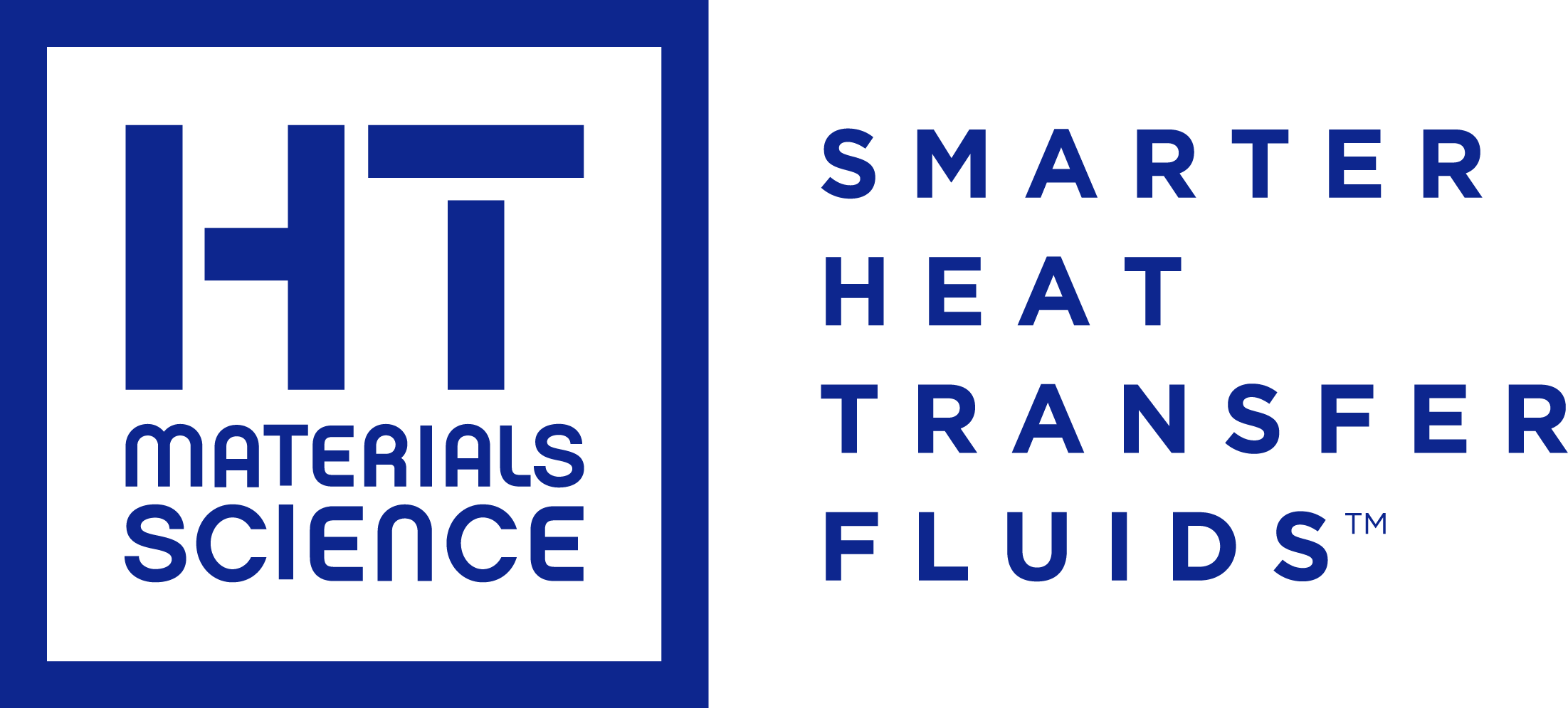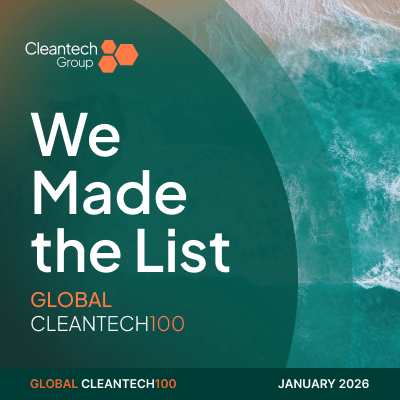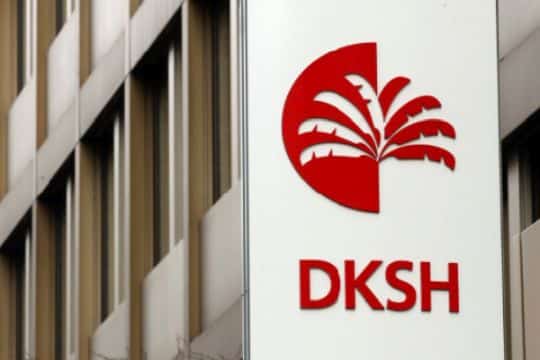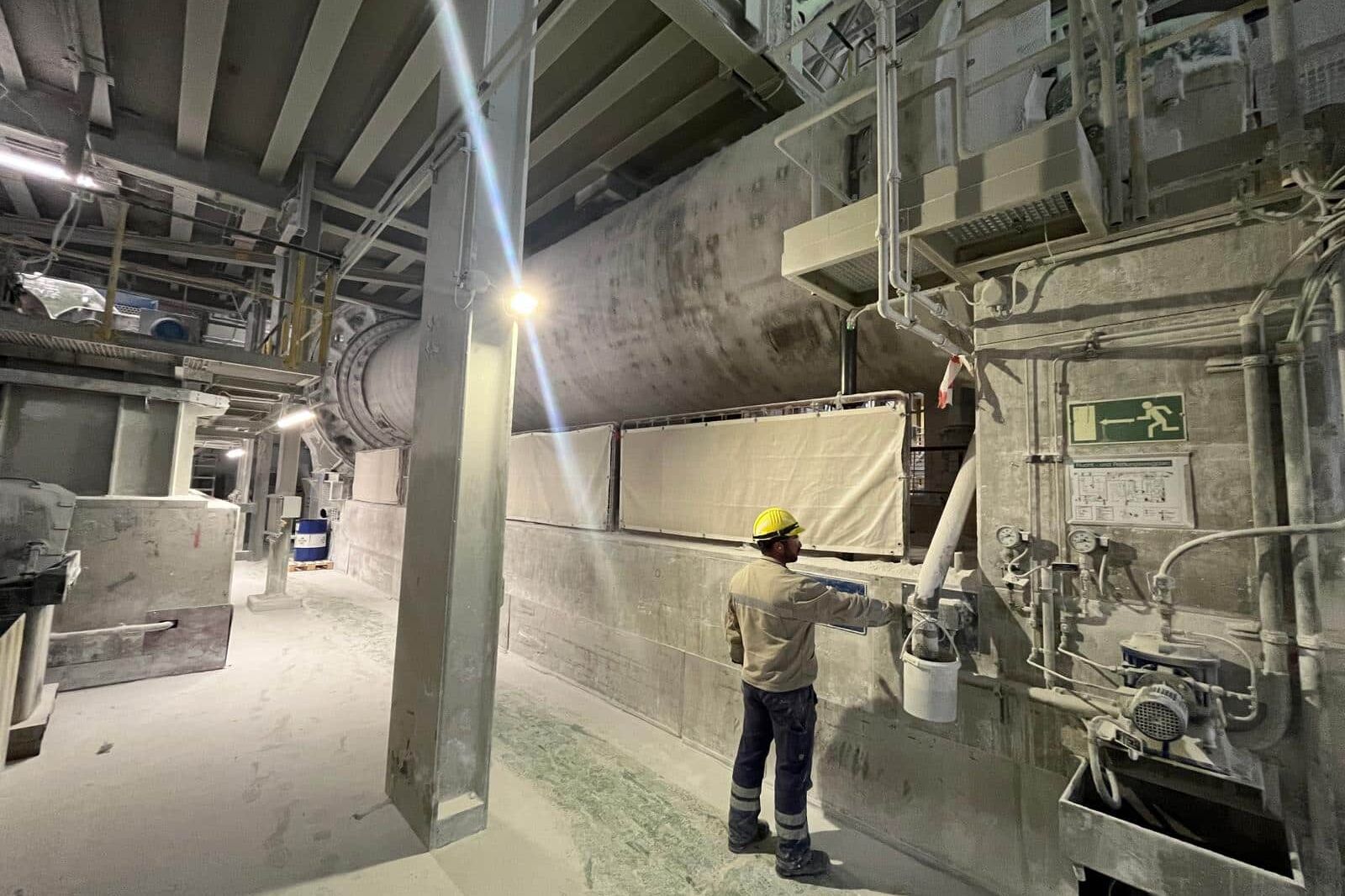HTMS Named on the 2026 Global Cleantech 100 List
A Year Defined by Intensifying Competition, Resource Security, and the Rise of Economic Durability as Cleantech’s New Mandate
14 January 2026 - San Francisco, CA
HT Materials Science, a global leader in providing advanced fluid additives for increased heat transfer, has been named on Cleantech Group’s 2026 Global Cleantech 100. This annual list recognizes companies poised to deliver market-ready solutions that advance a cleaner, more resilient global future.
Now in its 17th year, the report highlights innovators addressing some of the world’s most urgent environmental and infrastructure challenges. The Global Cleantech 100 is sponsored by Chubb.
A More Competitive Landscape Amid Tightening Macroeconomic Conditions
Following a 2025 marked by geopolitical volatility and shifting economic signals, the global cleantech ecosystem enters 2026 with slightly greater certainty—yet heightened competitive pressure. Growth is concentrating around two dominant themes: AI infrastructure and critical minerals.
These areas dominate this year’s “Grow” ring, while many other technologies remain in “Flow” or recede into “Slow”. This is creating a “pressure cooking” dynamic in which the "Grow" ring becomes more competitive, while the "Flow" and "Slow" become more difficult to break free from.
Data Center Frontier - Heat Transfer Fluids
Red Hot Data Center Growth Needs Smart Innovation to Stay Cool
By Benjamin Taylor | 22 September 2025
Recent innovations in HVAC technology offer cost-effective, efficient solutions to ease the strain data centers place on the grid
The rapid growth of data center construction, fueled by an almost insatiable appetite for artificial intelligence, has been a boon for the US economy with JP Morgan forecasting that AI alone will increase GDP by 20 basis points in the next twelve months. The US Department of Energy estimates that power used by data centers accounted for 4.4% of total national energy consumption in 2023, and by 2028 as much as 12%. That growth will put an enormous strain on power grids across the country.
A significant driver of any data center’s energy usage is the cooling demand for its chips which operate at temperatures < 77º. The energy required to maintain these temperatures can overload regional energy grids, particularly during a heat wave resulting in a power failure. While this situation might be manageable in some business sectors, it is untenable for the mission-critical services of data centers.
For this reason, data centers operators have engineered and deployed redundancies ranging from Tier 1 designs with minimal to no redundancies all the way up to Tier 5 configurations, which rely on extensive backup systems to maintain systems staying online during power or equipment failures. However, with rising energy costs, new chips that require more cooling and the increase in ambient temperatures, even these redundancies are inadequate over time to insulate data centers from the risk of overheating and overloading the power grid.
Fortunately, innovations have recently emerged in HVAC technology that offer cost-effective, efficient solutions to alleviate the strain that data centers are placing on our power grid.
One example of recent innovations is the development of heat transfer fluids that allow water-to-air-based cooling systems to operate more efficiently while lowering their overall energy consumption. These fluids reduce maintenance costs and increase thermal capacity, all without any major changes to existing infrastructure. One such example is Maxwell®, a heat transfer fluid manufactured by HT Materials Science (HTMS) that uses submicron particles of aluminum oxide to increase the thermal capacity of primary cooling systems by up to 15%. Maxwell® has been successfully deployed at over 30 locations by such companies as Amazon, Johnson & Johnson, Ericsson, Regeneron, Swire Properties and Aramco. HTMS is also developing in partnership with EcoLab Nalco innovative heat transfer fluids for direct to chip (DTC) and immersion cooling applications.
While the massive growth of AI has given rise to the aforementioned challenges, it can also play a key role in navigating solutions. For example, AI-optimized HVAC systems can analyze operating conditions in real time, anticipate potential problems and adjust cooling loads before any overheating occurs.
In addition to these advanced technologies, more traditional HVAC components that also improve efficiency include variable-speed fans, free cooling coils that use ambient air in cooler weather to cool the system, and high-efficiency pumps that optimize airflow and cooling distribution so that energy is only directed where and when it’s needed. Together these technologies offer a cost-effective way for older HVAC systems to be retrofitted and achieve greater performance without a full scale overhaul of the existing system.
While the expansion of AI has opened up a realm of seemingly limitless possibilities in the digital world, data centers are in fact limited by the constraints of our energy supply infrastructure. Now is the time for data centers to direct the spirit of innovation that has fueled the development of AI toward embracing new cooling system technologies that create more energy capacity for data centers to thrive.
Reproduced from the original article
Climate Control News - Maxwell at DKSH Malaysia
Retrofit delivers savings, no downtime
By Sandra Rossi | 20 August 2025
HT Materials Science (HTMS), a global leader in cooling technology, has successfully implemented its breakthrough heat-transfer fluid, Maxwell, at a pharmaceutical cold storage facility operated by DKSH Malaysia.
The installation resulted in significant energy savings, operational improvements and system performance—positioning the project as one of Southeast Asia's most effective commercial HVAC retrofits to date.
Created by suspending sub-micron particles of aluminium oxide in a base fluid of water or glycol, Maxwell is a non-toxic, fully recyclable additive that enhances heat transfer in industrial HVAC systems.
That improved heat transfer reduces energy consumption while increasing system capacity. For the DKSH Malaysia project, adding Maxwell led to a 13 per cent reduction in the chiller's energy consumption, for a projected annual savings of 600,000 kilowatt hours and a payback period of 2.1 years.
This installation was procured and engineered by Tri Quantity Sdn Bhd, an energy management and audit company based in Malaysia.
Based on energy savings alone, the payback period for this project is projected at just over two years.
It's a welcome innovation for a facility with strict temperature and humidity needs and regulations, as installing Maxwell requires no system downtime.
In addition to energy savings, DKSH expects reduced wear and tear on the facility's HVAC equipment, longer system lifespan and lower maintenance costs due to reduced scaling and improved fluid dynamics.
HTMS CEO, Thomas Grizzetti, said this installation demonstrates that smart, science-driven HVAC technologies can deliver immediate cost savings and long-term sustainability benefits.
“We're proud to partner with forward-thinking companies like Tri Quantity and DKSH who are helping to set the standards for energy efficiency in large-scale commercial facilities,” Grizzetti said.
"What makes this so compelling is the speed at which results materialized. Within weeks, we saw verified energy savings—demonstrating just how accessible and impactful these upgrades can be for building operators anywhere in the world."
The head of supply chain management, DKSH Malaysia & Brunei, Joel Solomon, said this initiative not only strengthens operational efficiency but also reaffirms DKSH's commitment to sustainable, future-focused business practices.
This project provides a compelling blueprint for how commercial facilities can unlock measurable energy gains through smart retrofits.
The results are applicable across industries including logistics, education, retail and data centres. HTMS contracts include performance guarantees, with minimum savings thresholds and annual reconciliation.
Reproduced from the original article
Data Center Dynamics - Cooling Supplement
DCD Chilling Innovations – Making a [nano] material difference to data center cooling
How nanofluids can improve cooling efficiency, even in legacy cooling systems
Georgia Butler Senior Reporter, Cloud & Hybrid – June 2025
Attend any data center conference, and you will find a plethora of new cooling solutions designed to meet the needs of the latest and greatest technologies. At around 700W and beyond, air cooling for chips becomes increasingly difficult, and liquid-cooling becomes the only realistic option.
Nvidia’s H100 GPUs scale up to a thermal design point (TDP) of 700W, and its Blackwell GPUs can currently operate at up to 1,200W. The company’s recently announced Blackwell Ultra, also known as GB300, is set to operate at a 1,400W TDP, while AMD’s MI355X operates at a TDP of 1,100W.
Recently, liquid cooling firm Accelsius conducted a test to show it could cool chips up to 4,500 watts. Accelsius claims it could have gone even higher but was limited by its test infrastructure, rather than the cooling system itself.
But the reality is that, while much of the excitement and drama in the sector focuses on the needs of AI hardware, the majority of workloads in data centers are not running on these powerful GPUs. The density of these racks is also creeping up, if not to the same level, and many companies are not willing to fully rip-and-replace cooling systems in costly and complex programs.
While many companies are looking to reinvent the wheel with flashy new cooling set-ups, a large cohort of data center operators are focused on refining their existing systems, looking to unlock additional efficiencies wherever possible and improve their cooling capabilities at a rate that is appropriate for their needs. One way of doing this is to optimize the fluid used in existing cooling systems.
Nanoscale changes
A large portion of “air cooling” solutions still use liquid at some point in the system – usually water or a glycol-water mix. When it comes to the choice of fluid, water is typically considered more efficient at transferring heat, but water-glycol can be more suitable when freeze protection is needed. But, regardless of whether it is a water or a glycol-mix base, Irish firm HT Materials Science (HTMS) says that it can make your system more efficient with “nanoparticles.”
HTMS was founded in 2018 by Tom Grizzetti, Arturo de Risi, and Rudy Holesek. According to Grizzetti, the company’s Maxwell solution stems from a research initiative that started more than 15 years ago at the Università del Salento in Lecce, Italy. The team was exploring how nanotechnology could be used to fundamentally improve heat transfer in fluid systems. Grizzetti says of that time: “It’s one of those rare startup scenarios where deep science meets a real-world market need at just the right moment.”
To date, HTMS’s customer base hasn’t primarily been data centers, with its solution currently deployed at industrial sites and Amazon fulfilment centers, but the company is targeting the sector and talking to operators because, it says, it can see a strong use case.
Nanoparticles are ultrafine, tiny particles. In the case of HTMS’s “Maxwell” solution, these particles average 450 nanometres in size and are made of aluminum oxide. “Our product is a simple a fluid additive that goes into any closed-loop hydraulic system, whether that be air-cooled chillers or the vapor side of water-cooling chillers,” Ben Taylor, SVP of sales and business development at HTMS, explains. Taylor makes the bold claim that Maxwell will improve efficiency at “every heat exchanger in the loop – whether it be the evaporator, barrel, chiller, the coil, or the air handler – they all see better heat transfer capabilities.”
Aluminum is well known for its heat transfer properties. The metal alone has a thermal conductivity of approximately 237 W/mK (Watts per meter per Kelvin), and the aluminum oxide compound (also known as alumina) has a relatively high thermal conductivity for a ceramic material, typically around 30 W/mK.
While having a lower thermal conductivity than pure aluminum, alumina is more suited to cooling systems as it has greater stability and durability, meaning it works well in high-temperature and high-pressure applications, and provides better corrosion resistance. All of which has been backed up by several scientific studies, including the paper ‘Experimental study of cooling characteristics of water-based alumina nanofluid in a mini-channel heat sink, published in the Case Studies of Thermal Engineering Journal.
The fact is that although alumina is a well-established additive for thermal conductivity solutions, it isn’t widely adopted by the data center industry. While at the Yotta conference in Vegas in 2024, DCD met with HTMS and asked about competition in the industry – only to be told that, currently, they aren’t really facing any.
The nanoparticle solution can be injected into new and old cooling systems, Taylor says, “You get more efficiency in your system, and even if it’s an older system, you can start to do more than you thought you could,” he says. For many data center operators, this is music to their ears. Ripping out and replacing cooling systems costs time and money, but with the growing cooling needs of hardware and increasing regulatory pressures in many markets, finding efficiencies is paramount.
There are, of course, upfront costs associated with the installation of the heat-transfer fluids, but HTMS estimates that companies see payback on this within three years, and some in as little as one year.
Efficiency and environmental impact
From the perspective of sustainability, Taylor says that Maxwell’s carbon footprint is low. “A lot of customers will break even on CO2 emissions within the one to three- month mark,” he says. “We are seeing existing systems that need more capacity, and new systems that are trying to be as efficient as possible because a lot of them are going to start taking up a lot of the power grid – and plenty are already using a lot of power. “They are looking for a more overall energy efficient system…”.
When utilizing Maxwell, the chiller efficiency improvements seen in cooling capacity vary depending on whether the customer uses water or a glycol mix. When Maxwell is injected into the system at just a two percent concentration, Taylor says that a water-only system can see around a 12 to 15 percent increase in heat transfer abilities, and then with a mix of around 30 to 40 percent glycol, that 2 percent Maxwell concentration can improve heat transfer capability by over 20 percent.
Deploying Maxwell is a simple process, Taylor says. “We have everything pre-blended and then inject it into the system,” he says. “We need the pumps to be running, unless we are filling the system right out of the gate.” HTMS usually recommends also installing a “monitoring and maintenance unit” (MMU) on the site – a device which monitors the system and maintains the appropriate chemistry and mixture of particles.
Jim McEnteggart, HTMS’ senior vice president of applications, explains: “We usually ship at around 15 percent volume. It’s a liquid, and we then pump it through the system through connections typically on the discharge side of their normal pumps. “The concentrated products mix with their system, and then we drain it out on the suction side of the pump. There, the MMU has instrumentation that measures the pH and density. When those parameters reach their target values, we know we have enough nanoparticles in the solution to achieve the desired outcome, and we stop injecting.”
McEnteggart adds that HTMS assumes around a “five percent leaking rate per year” according to ASHRAE standards, but that once Maxwell is in a system, the company says it can last for ten years. “In reality, everything in the loop won’t degrade the aluminum oxide since it’s chemically inert,” McEnteggart says. “So, unless there’s a leak, the product can stay in there for the life of the system.”
That chemical inertia is also a positive factor in terms of the impact – or lack thereof – that the solution could have on the environment if there were a leak. “It’s not toxic,” says McEnteggart, but of course it can’t be flushed down a drain in large quantities since we don’t want it discharged into sewer systems. Additives can sometimes be PFAs – per or polyfluoroalkyl substances, also known as “forever chemicals”. The nanofluids, while considered an additive, do not fall into this category.
Should a customer want to remove Maxwell from its system – which McEnteggart assures DCD none have so far – it’s a combination of mechanical filtration and chemical separation. “If we lower the fluid pH into the acidic range – so, below seven – the particles drop out of suspension. They settle very quickly, and we can do that on site…just pump the system fluid in batches out into separate tanks and add an acidic compound to get the particles to collect at the bottom of the tank. We extract from there, and then everything else gets caught by a ceramic filter with very fine pores. Then we neutralize the solution once nanoparticles have been removed, and it can be re-circulated back into the system.”
Alumina, and nanofluids by extension, have not sparked much conversation in the industry thus far. As a result of this, it occurred to DCD that there may be some issues in providing the solution en masse should the industry show significant interest. “We would definitely have to scale up very quickly,” concedes Taylor. “But a good thing is that the way the product is made is quite a simple approach. Once we see interest growing, we can forecast that, and all we’d have to do is set up additional manufacturing lines requiring two or three specific pieces of high-tech processing equipment.
HTMS has at least one data center deployment that they have shared in a case study, though the company remains anonymous beyond noting the facility is located in Italy. The likes of Stack, Aruba, TIM, Data4, Equinix, Digital Realty, OVH, and CyrusOne, as well as supercomputing labs and enterprises, operate facilities across Italy.
While unable to share identifying details about the Italian deployment, the total power of the chiller system was 4,143 kW (1.178 RT) and consisted of three chillers and one trigeneration system. According to the case study, the data center saw a system coefficient of performance improvement of 9.76 percent.
But a big part of the challenge when entering a long-secretive industry is getting your name out there if clients won’t let you share their story. “A lot of them [data center operators] are pretty sensitive about having their names out there,” admits Taylor, though the company remains hopeful that it will fully conquer the data center frontier.
Excerpted and edited from the original article
7 x 24 Exchange - Trading Off to Keep Cool
Data center HVAC systems must strike a delicate balance between efficiency, redundancy and cost—all while ensuring operational reliability and meeting growing energy demands.
www.7x24exchange.org
Ben Taylor
One of the most crucial components of information infrastructure is invisible to the human eye, yet it’s an infinite source of worry—not to mention cost—for the professionals who build and maintain data centers. I’m talking, of course, about temperature control. In 2025, the most imperative component of temperature control is keeping processing equipment cool enough to run as efficiently—and to last as long—as possible.
Cooling the machines that store and process data is an increasingly onerous task, especially as extreme weather becomes more common and the adoption of power-hungry AI continues to accelerate across industries and markets. Data center space cooling currently accounts for approximately 10 percent of U.S. electricity consumption (though that number can be as high as 20 percent in some states), according to the Energy Information Administration. And that percentage only stands to increase as global temperatures rise in tandem with demand for AI and other rapidly evolving technologies.
Even recently built data centers are struggling to keep up with new challenges, from rising energy costs to computing loads. Traditional cooling methods are being pushed to their limits as AI-driven workloads generate more heat than ever before. Meanwhile, the unpredictability of extreme weather—heat waves, hurricanes, winter storms and more—means that backup systems are being called into action more frequently, further straining efficiency and increasing maintenance costs.
To bridge the gap between traditional infrastructure and the evolving data economy, we must rethink how we design, maintain and innovate the systems that keep data centers cool. The future of resilience isn’t just about redundancy—it’s about adaptation, optimization and evolution. It’s time for data centers to embrace HVAC innovation in order to keep up with increasing demand while reducing operating and maintenance costs. Luckily, several new technologies are aimed at making existing systems more efficient while avoiding service disruptions.
For some facilities, the answer has been to transition from air-cooled to liquid-cooled systems, which can improve efficiency but introduce their own set of maintenance challenges, including leak prevention and fluid monitoring. Others are looking toward hybrid solutions, combining advanced cooling materials, AI-driven HVAC optimizations and retrofits that enhance performance without requiring full system overhauls.
Emerging materials like hydronic-based nanofluids are proving to be game-changers in HVAC efficiency. By enhancing heat transfer in closed-loop systems, the simple addition of certain nanofluids can reduce energy consumption, lower maintenance costs and increase system capacity—all without requiring major infrastructure changes.
Another emerging solution relies on AI to optimize cooling systems dynamically. Machine learning can analyze real-time conditions and adjust cooling loads to prevent overheating before it becomes a problem. Additionally, variable-speed fans and high-efficiency pumps help optimize airflow and cooling distribution, ensuring energy is only used when and where it’s needed. Retrofitting older systems with these energy-efficient technologies offers a cost-effective way to improve performance without requiring complete overhauls.
With ever-increasing demand for uptime, efficiency and sustainability, HVAC technology must evolve along with the data centers it services. By implementing cutting-edge technologies and prioritizing smart energy management, information facilities can maintain reliability even while reducing energy and maintenance costs. This is critical because, for data centers, there is no pause button.
‑ Reproduced from original source
Fast Company Award for 2025
HTMS selected by Fast Company as one of 10 most innovative companies in manufacturing for 2025
March 18th, 2025
Rob Pegoraro
Advances in manufacturing (faster, cheaper, smarter) don’t always result from one big technological breakthrough: much of the work of innovation involves building on what people have accomplished before.
Both P2 Science and HT Materials Science have drawn on their own inventions in chemistry to create cleaner and greener cosmetics and to make heating and air-conditioning systems more efficient and less thirsty for water. And since HT counts factories among its clients, future occupants of this list may rank among the beneficiaries of its work.
5. HT Materials Science
For identifying an additive that makes HVAC systems more efficient
The digital revolution giveth, and the digital revolution taketh away: On the one hand, smart technologies are improving energy efficiency; on the other, data centers and crypto-mining operations and fulfilment operations consume a massive and growing amount of energy that’s expected to double by 2030. About 40% of that consumption is attributable to energy required to keep operations cool.
Dublin-based startup HT Materials Science doesn’t make heating/ventilation/air-conditioning systems, but it does make the HVAC hardware already installed at commercial and industrial sites significantly more efficient. The company accomplishes this with its proprietary drop-in additive called Maxwell, which suspends microscopic particles of aluminum oxide in water or a mixture of water and glycol to improve heat transfer. Adding just a tiny bit to an HVAC system’s water or water-glycol mix helps juice efficiency by up to 20%.
HTMS has strategic partnerships with a number of prominent companies, including Regeneron and Saudi Aramco, and in May 2024 it was accepted into Amazon’s Sustainability Accelerator to deploy Maxwell at a trio of fulfilment centers in the U.K.
‑ Reproduced from original source
Forbes Council Article
How Commercial Building Owners Can Leverage Cost-Effective Retrofitting
Dec 23, 2024,07:45am EST
Thomas Grizzetti, CEO, HT Materials Science
As we prepare to leave 2024 behind and look ahead to 2025, it’s important to recognize how far the commercial HVAC industry has come—especially as businesses across the world continue seeking our help in reducing operating costs, carbon emissions and, of course, energy bills. It’s also important to think about what more we can be doing—and about just how impactful and far-reaching HVAC efficiency improvements can be when implemented at scale.
Companies are adopting greener, more energy-efficient systems. Energy efficiency standards, like those set by ASHRAE, are crucial drivers. These evolving standards are forcing companies to rethink their energy strategies. Local laws, such as New York’s Local Law 97, are further driving the need for more aggressive energy-efficiency measures, ensuring that cities continue progressing toward their decarbonization goals.
I haven’t always been passionate about the HVAC industry, but after several decades of investing in companies across a variety of sectors, I began to fully grasp the HVAC industry’s need for both innovation and reduced environmental impact. Now, as CEO of a company providing simple retrofit solutions for commercial HVAC systems, I recognize that upgrading HVAC equipment or replacing it entirely is not feasible for most companies. The path to a more sustainable HVAC future doesn’t have to rely solely on capital expenditures. Instead, businesses can explore lower-cost innovations, retrofits and optimizations to existing systems to reduce energy consumption and improve cost-efficiency.
Sustainability Isn’t Just About New Equipment
Sustainability shouldn’t come with a blanket prescription to “buy new.” In my experience, smart retrofitting can yield immediate benefits, including reduced energy consumption, without the high costs and operational disruptions of replacing entire systems.
For example, instead of replacing an entire HVAC system, companies can install more efficient compressors, variable-speed pumps or upgraded controls to maximize performance.
Retrofitting also has the added benefit of extending the lifespan of current systems, giving building owners more time before they need to consider a costly replacement. And, perhaps most importantly, retrofits involve less disruption to daily operations compared to full equipment replacement.
The Double-Edged Sword Of New Refrigerants
One area where the HVAC industry is seeing mandated change is refrigerants. For years, traditional refrigerants like R-410A have been used in HVAC systems. However, these refrigerants are being phased out due to environmental regulations aimed at protecting the ozone layer. The next wave of refrigerants is less harmful to the environment in terms of emissions, but they often come with a trade-off: lower efficiency.
Refrigerants play a critical role in heat transfer, and as newer, more environmentally friendly options are introduced, I believe the efficiency of HVAC systems will likely decrease. This change may be problematic for businesses trying to reduce their carbon footprint and control energy expenses. That said, a well-planned retrofit can maintain or increase system efficiencies and avoid skyrocketing energy costs.
Understanding Efficiency And The Grid
One of the hidden advantages of making HVAC systems more efficient is the relief it provides to the power grid. Energy-efficient systems consume less electricity, helping reduce strain on local power supplies. This reduced consumption can help prevent rolling brownouts or blackouts, which are increasingly common as the demand for energy-intensive services, such as data centers, grows. Retrofitting commercial buildings with more efficient HVAC systems can benefit both building owners and tenants by reducing electricity demand (especially during peak periods) and operating costs over time while keeping building temperatures comfortable.
District Energy: An Overlooked Champion
One area where significant sustainability gains are being made is district energy systems. These systems allow for the sharing of heating and cooling resources among multiple buildings or even cities, making them significantly more efficient than standalone HVAC systems. District energy systems can capture waste heat from one building—such as a data center—and use it to provide heating to other buildings nearby. This energy recovery can create a circular energy economy, reducing the need for additional energy production.
Preparing Your Building For A Retrofit
In order to understand and prepare for a retrofit, building owners must first understand whether the technology is suitable for their buildings. To start, building owners should review the past performance of the proposed retrofit, review the installation and maintenance procedures for potential disruption to operations, and, of course, have a keen understanding of the economics of the retrofit investment (i.e., ROI & payback), including any product warranties and performance guarantees.
Initially, building owners should focus on performance verification. This process starts with the review of energy efficiency data provided by the retrofit vendor for a building with similar size, construction type and cooling/heating loads as well as comparable HVAC equipment and seasonal operating metrics. Secondly, request and review any third-party performance certifications.
If you are satisfied that the data provided is acceptable, then the building owner must request and approve a measurement and verification (M&V) plan from the retrofit vendor. The M&V plan should include a protocol to compare the baseline operating metrics of the building before the installation of the retrofit to the new operating metrics of the building after the installation of the retrofit technologies. A generally accepted M&V protocol is the International Performance Measurement and Verification Protocol (IPMVP). Most M&V plans should run for 12 months with monthly reporting and periodic reporting thereafter.
Next, I would recommend a deep read into the installation and maintenance procedures. Generally, there should never be a material disruption to the operations of your building, and the existing building control system should be able to monitor, control and optimize the retrofit. Finally, owners should take steps to understand the economics. What are the annual energy savings versus retrofit cost (i.e. payback)? How does the payback compare to the ROI (i.e., useful life of retrofit/payback)?
These preparation procedures may seem daunting, but with proper due diligence, building managers in coordination with HVAC service will be able to make an informed decision.
The Future: Smarter, More Flexible Systems
The HVAC industry is nearing a plateau in squeezing more efficiency from traditional chiller and heat pump equipment. The next generation of technology must be smarter (e.g., AI-based system and building optimization strategies) and more adaptable. Building owners and operators should consider implementing a blend of retrofitting, improved controls and leveraging new technologies, as well as prioritizing solutions to deliver both short-term gains and long-term sustainability.
Tabreed wins "District Cooling Initiative of the Year"
Pilot study with HTMS to explore the potential of Maxwell nanofluid technology, which achieved an impressive 15% increase in cooling system efficiency
ABU DHABI, UAE (BUSINESS WIRE) – October 25th, 2024
Tabreed, the world’s leading district cooling company, has been honoured at the prestigious 2024 Asian Power Awards, held this week in Singapore. Recognising Tabreed as a long-established champion of sustainable cooling, judges awarded the company with two significant awards: ‘Geothermal Power Project of the Year – Gold’ and ‘District Cooling Initiative of the Year – UAE’.
“Our pursuit of energy efficiency knows no limits”
The Asian Power Awards is a prestigious event that recognises innovative, ground-breaking projects and initiatives by power and energy companies. It honours those who have taken game-changing steps to address the effects of the climate crisis while meeting the growing demand for energy. Representing Tabreed and accepting the two awards on the night was Irshad Hussain, Vice President – Projects.
Geothermal Power Project of the Year
With its strategic partner, ADNOC, Tabreed is leading the way in sustainable cooling with its ‘G2COOL’ Geothermal Project in Masdar City, Abu Dhabi. Operations commenced in December 2023, with this innovative facility using geothermal energy to provide cooling services and integrating with a pre-existing district cooling network. It is the first district cooling plant of its kind in the Gulf region, helps decarbonise cooling in Masdar City and aligns with the UAE’s National Energy Strategy 2050.
This plant utilises hot water from geothermal sources deep underground to power a special absorption chiller, which achieves an impressive electrical efficiency of 0.5 to 0.55 kW per refrigeration ton (RT), compared to the typical 0.85 kW per RT in conventional district cooling systems. Geothermal energy produces minimal emissions compared to traditional methods, supporting the UAE’s goals to diversify energy sources and lessen reliance on fossil fuels.
District Cooling Initiative of the Year – UAE
This award honours a pioneering pilot study at one of Tabreed’s Abu Dhabi plants in collaboration with Ireland’s HT Materials Science (HTMS), to explore the potential of a revolutionary nanofluid technology known as ‘Maxwell’, which has been engineered to enhance heat transfer. Tabreed discovered that, by using Maxwell in the chilled water loop, it achieved an impressive increase in cooling system efficiency of approximately 15%.
Maxwell, named after James Clerk Maxwell, the pioneering scientist who first developed the concept of nanofluids in the 19th century, is an engineered suspension of sub-micron aluminium oxide particles in a base fluid of water or water/glycol (‘nanofluid’) – a drop-in additive for cooling and heating systems, that works by enhancing heat transfer efficiency in cooling systems without requiring complex tools or equipment replacement.
Commenting on the awards, Tabreed’s Chief Executive Officer, Khalid Al Marzooqi, said they serve as important reminders that the company’s pursuit of sustainable operations exemplifies its wider commitment to a greener future. “Our pursuit of energy efficiency knows no limits,” he said. “We lead this essential industry with our innovative approach, in which we leave no stone unturned to reduce energy consumption and our impact on the environment. I’m very proud of what everyone at Tabreed achieves and being honoured with these awards is an acknowledgement of the vital steps we’re taking to decarbonise the building sector.”
Tabreed has previously stated its aim to expand its international presence, with a particular focus on Southeast Asia. The company, which was founded in 1998, is already operating in six countries with a growing portfolio of district cooling plants, currently numbering 91. As more countries experience the adverse effects of rising global temperatures, the demand for cooling is rapidly increasing. As the world’s leader in sustainable district cooling, Tabreed’s operations prevent millions of tons of CO2 emissions through its substantial energy savings.
About Tabreed:
Tabreed provides essential and sustainable district cooling services to iconic developments in the Middle East and Asia – a leading driver of progress for people, communities and environments around the world towards a more sustainable future. Founded in 1998 and publicly listed on the Dubai Financial Market, it is one of the UAE’s strongest growth companies.
Through its extensive regional and international operations, industry-leading reliability and efficiency, R&D programmes and investment in AI technology, Tabreed is the district cooling industry’s global leader. In addition to district cooling, Tabreed’s energy efficiency services extend the company’s sustainability impact, helping businesses and organisations to improve their overall energy consumption, in turn preventing CO2 emissions and assisting in the achievement of carbon neutrality objectives.
Facility Management News - Maxwell at Second Industrial Plant
Reposted from FMLink (Facility Management News and Resources from the McMorrow Reports
by Janet B. Stroud — October 21, 2024
Dublin-based HT Materials Science (HTMS) recently announced the successful deployment of Maxwell, a ground-breaking heat transfer fluid for commercial and industrial cooling and heating systems, at an industrial plant. The plant, located in Ludwigshafen, Germany, is owned and operated by Almatis GmbH, a world leader in the development, manufacture and supply of premium alumina (aluminum oxide) and alumina-based products.
Maxwell increased segments of the plant’s cooling system capacity by approximately 20%, which results in an increase in production capacity by an estimated 10% or more per year. The Ludwigshafen plant produces high-quality materials for the refractory, ceramic and polishing industries, and is one of the company’s eight production facilities.
The installation was commissioned to demonstrate that Maxwell could reduce the plant’s maintenance requirements and increase production capacity during certain periods of high ambient temperature. This is the second industrial plant in which Maxwell has been used to achieve similar results.
Maxwell is an engineered suspension of sub-micron particles in a base fluid of water or water/glycol (“nanofluid”). Maxwell is a drop-in additive for cooling and heating systems, that works by enhancing heat transfer resulting in reduced energy consumption and increased thermal system capacity.
Almatis’ Ruediger Bastian, global director of Process Technology, stated:
This project is a testament to our pursuit of energy efficiency at every level of our operations. We are always looking for ways to accelerate the energy transition and provide more efficient services that benefit our customers, our stakeholder and the communities in which we operate. This successful project proves the power of international partnership and technological collaboration, and we look forward to working with HTMS to further the application of their technology to advance sustainable cooling solutions.
How Maxwell Works In a Chilled Water System
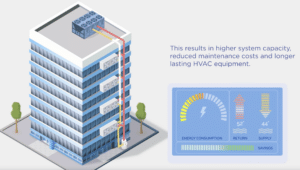
When added to a chilled water loop at 2% concentration, Maxwell increases the system’s cooling capacity by up to 20%, explains HTMS. This increased cooling capacity allows chillers, pumps, heat exchangers and other process equipment to operate more efficiently, reducing electrical energy consumption and carbon emissions. Maxwell is non-toxic, non-corrosive, fully recoverable and recyclable.
Thomas Grizzetti, CEO of HTMS, remarked:
Thanks to the ease of installation, and use in both new and existing cooling and heating systems, Maxwell can have a material impact on energy usage and the carbon footprint of a broad range of industries and sectors globally. Maxwell is a significant step forward for businesses wishing to drive down energy use, increase system capacity and meet regulated energy efficiency targets increasingly promulgated by governments globally.
HTMS is one of 15 start-ups from across Europe picked to be part of this year’s bigger-than-ever Amazon Sustainability Accelerator. HTMS is among the participants hoping to grow by helping other businesses reduce their impact on the environment.
Construction Week (Middle East): Sustainable Housing Solutions
Sustainability considerations now permeate the entire property value chain
CONSTRUCTION WEEK (Middle East) – by Medea Nocentini July 09, 2024
With growing sustainability concerns and heightened scrutiny over various sectors’ contributions to climate change, the property sector’s impact is under the spotlight. As the largest asset class globally, with a market size exceeding $338 trillion in 2022, the property sector’s status quo is being re-evaluated through the lens of sustainability.
Sustainability considerations now permeate the entire property value chain, affecting designers, developers, property managers, regulators, residents, and tenants. Currently, 43% of global carbon dioxide (CO2) emissions stem from the real estate sector, with building operations accounting for approximately 70% and construction contributing the remaining 30%.
Investors are increasingly prioritising sustainable practices, recognising both the potential value and profitability in properties managed with a focus on sustainability. Among these investors, 63% are exploring the adoption of building and IoT sensors, while 62% are investigating automated energy management as well as sustainability monitoring and reporting.
Innovative approaches to sustainability in the property sector
The sustainability shift within the property sector is compelling, driven by cutting-edge solutions in material sciences, 3D printing, water management and energy efficiency. As the third-largest contributor to CO2 emissions, the potential for a net-zero paradigm shift in property development is significant, promising climate-conscious developments that enhance efficiency and affordability.
Beyond material choices, there is a clear move towards sustainability in building amenities and central HVAC systems. Lighting and other energy-efficient systems are being integrated from the early stages of the value chain.
Initiatives like the UAE’s Al Sa’fat and Pearl rating systems, Saudi Arabia’s evolving national building codes, and the Africa Green Building Finance Initiative emphasise the need to incorporate sustainability into decision-making processes.
On the water management side, Ireland’s HT Materials Science, with Saudi Aramco as one of their clients in the GCC region, develops advanced heat transfer fluids, focusing on enhancing the efficiency of cooling and heating systems.
Their primary product, Maxwell™, is a nanofluid additive that improves thermal performance by up to 15%, leading to lower energy consumption and reduced carbon emissions.
Maxwell™ can be integrated into existing systems without significant modifications, making it suitable for a range of applications including commercial buildings and data centers.
The shift towards sustainability in the property sector is not just a response to environmental concerns but a comprehensive strategy to enhance efficiency, profitability, and affordability.
By embracing innovative materials, advanced manufacturing techniques, and energy-efficient practices, the property sector can significantly reduce its carbon footprint while meeting the growing demand for sustainable and affordable living spaces.
‑ Reproduced from original source


